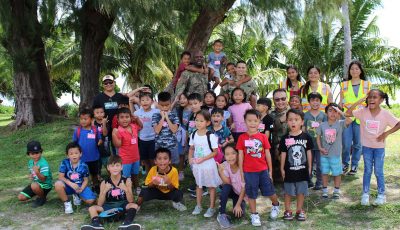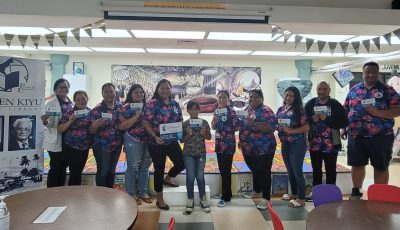Hardship in paradise
Poverty hurts everyone who’s affected. It reflects the scarcity of financial wherewithal to support the basic needs of the people.
It is a situational challenge where you learn to muddle through the thick walls of poverty. It means you go through the day beaten intellectually with nothing to hold on to except suspect hope. You reset buttons to move on.
It’s a no-win situation where you quickly learn how to survive. Imagine faucet water for breakfast, going to class without school supplies, rags to cover yourself, and a sense of helplessness most of the day knowing you’d head home after school for more faucet water.
The hardship on families was prompted by the shift from subsistence living to jobs in both public and private sectors. Unfortunately, jobs disappeared when the Navy left here in the early ’60s. It also reduced salaries from $.75 an hour to $.16 an hour.
It meant a return to farming and fishing to supplement family dietary and other basic needs. It was a near complete reversal to original subsistence lifestyle. It was devastating for many families reworking scarcity amidst mounting obligations.
It was further severed by the obvious lack of a decent economy that supported family wellbeing. It’s basically loose subsistence that has no purpose or goal other than serve as an empty “cover.” In ignorance we embraced what was handed down to us where at best, we started second-guessing our future.
Amidst the imposition our elderly struggled to make sense of it—our proven ways and the new way—immediately after leaving Japanese impositions. Unimaginable the task to understand the shifting ground where they’re supposed to stand firmly as they guide family wellbeing in these isles. Disorienting!
After several impositions, e.g., Spanish, Germans, and Japanese, the indigenous people learned to follow along for purposes of survival. Perhaps it relied on the fact that these isles were indigenous-owned, therefore we would survive come what may. And we did!
We finally were given the opportunity in 1972 to decide our fate. In 1978, we took over self-rule that steadily emplaced constructive policies for our developmental growth. Today, it’s all a matter of policy refinement with domestic dispositions.
Our mini-tourism and other pertinent sectors have provided the economic cushion that we have today. A lot of work remains in their refinements. It’s all a matter of time under the umbrella of self-government that takes a process to attain political maturity.
Poor
Like I noted earlier, I’ve lived in abject poverty a long time ago. Ever had to drink faucet water for breakfast? Ever munched on boiled banana you force down with faucet water? Ever cut class Christmas parties because you can’t afford $0.25 cents?
It’s an experience poor kids endure who hail from homes where abject poverty is a daily reality. We made with what little we had with nothing but suspect hope in our hearts for a brighter break of dawn.
You may make a mockery how cheap twenty-five-cents may be. But it buys a can of mackerel that feeds the entire family! Wasn’t ready to sacrifice my brothers’ wellbeing for a tuna sandwich class X-mas party. Cooking a can of mackerel with pumpkin tips is one grand dinner for the family.
Those hard days ended in 1968. How interesting, though, that to this day I still hear lyrics to a song that says, “those were the days my friend I thought would never end….” Memories of yesteryears!
Assistance
Be that as it may, it’s good that there are federally funded programs to help families meet dietary needs. Some housing assistance has also been extended to those in dire need of shelter over their heads.
The federal rate for poverty level wages and salaries is between $15K and $42K per year. Most employees here fall within the $15K to $18K income category.
It’s a difficult issue when measured against the cost of basic needs that race ahead of mini-incremental salary hikes. How do we resolve this issue? Did someone say “leadership?” Or did they mean “followership”?
Subsistence
The answer is in our reliance on traditional lifestyle of farming and fishing. We had our share of walking to and from the family farm in As Perdido and dipping our heads along the shores of Lali Fo`. Yes, I remember pocketing a tiny fish and cooked it for dinner. At least it wasn’t rice and faucet water.
We collect firewood and hauled it home in order to ensure meals are cooked. They were difficult days the path turned gold when we last look back into fond memories of yesteryears.



























